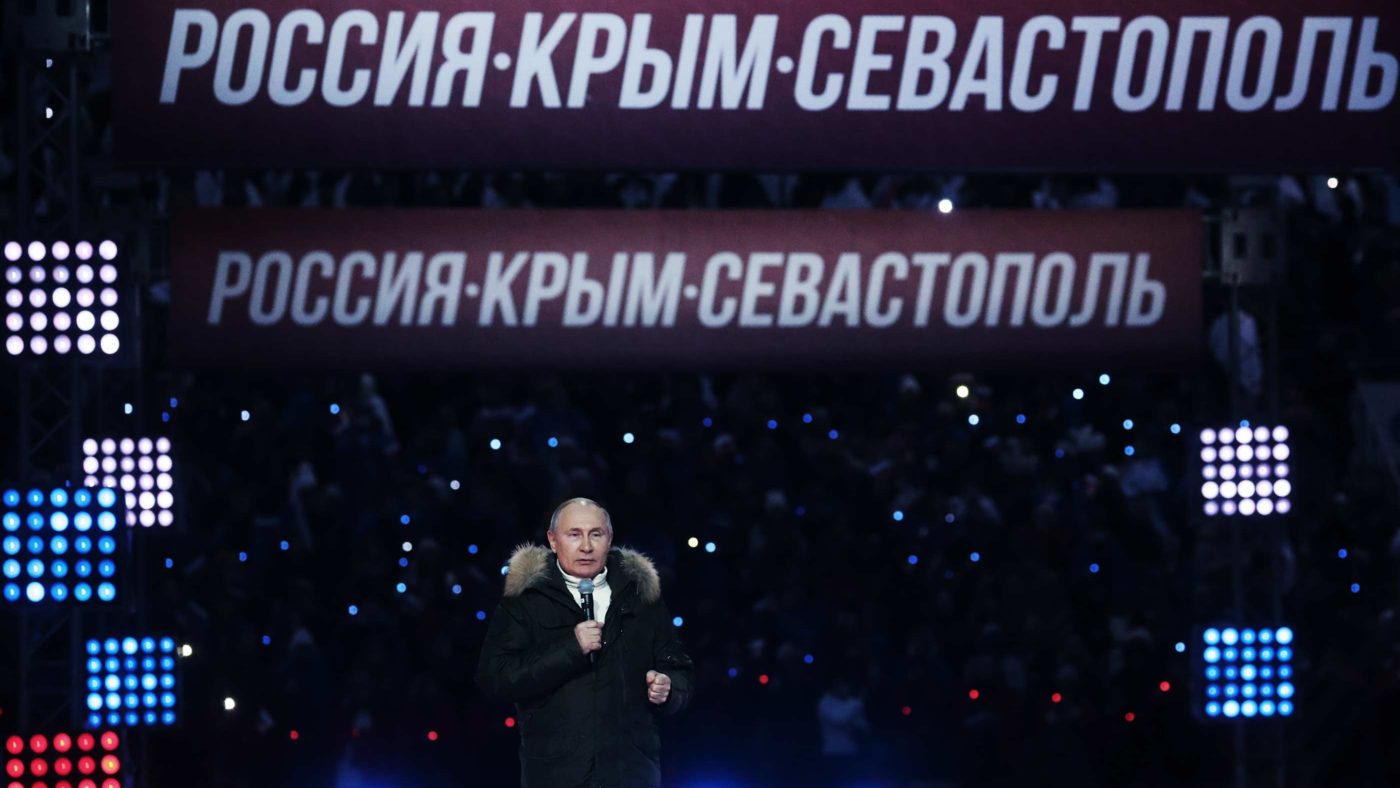Russia’s move earlier this week to shut off access across the Kerch Strait and began harassing Ukrainian warships was just the latest step in an ongoing military escalation that has seen thousands of troops and masses of weaponry moved to occupied Ukraine and its borders. While alarming, the ostentatious nature of the military movements has set it apart from earlier Russian interventions in Ukraine, which were defined by stealth and surprise. This demonstrative character, as well as the lack of logistical support for a longer-term offensive, suggest that the build-up does not herald an imminent invasion so much as performative posturing.
In part, it is a signal to Ukraine’s Western allies, and the new Biden administration in particular, to treat Russia as a powerful global player and stay out of what Russia euphemistically terms its ‘near abroad’ – in other words, its self-proclaimed sphere of influence. When Joe Biden called Vladimir Putin to offer a summit, pro-Kremlin legislators and propagandists alike crowed over the global significance of this invitation, interpreting it as the US President blinking first in the face of Russia’s military and diplomatic heft.
Although they were left red-faced when the White House announced sanctions the following day, this framing has tied neatly into longstanding narrative that Putin has restored Russia’s great power status, lost when the USSR collapsed in 1991. The Russian government has been vociferous about its desire to return to what it describes as the rules-based post-war order decided at Yalta in 1945. Putin and his acolytes do not want to rebuild the USSR, but they do depict themselves as reviving key parts of it, particularly superpower status and influence. None of this is possible without an acquiescent Ukraine.
After the fall of the Soviet Union, millions of Russians remained living in newly independent countries, generally without giving rise to ethnic tensions. Despite this, after Ukraine’s Revolution of Dignity in 2014, televisions across Russia blared with alarmist calls to protect compatriots and resolve historical injustices, such as the Soviet-era transfer of Crimea. These narratives have pervaded in domestic Russian media and resurfaced recently in the Kremlin’s claims that its military build-up is aimed at defending Russian citizens from Ukraine and Nato.
That said, there is little appetite for further mobilisation right now among ordinary Russians. In polling conducted against the backdrop of the recent escalation, a third of Russians agreed that the conflict in Ukraine would drag on for many years to come, up from just 12% in 2015. It is very hard to disagree with this position, which suggests that Ukraine’s allies need to pursue a longer-term and more comprehensive strategy even as – perhaps especially as – we firefight Russia’s current manoeuvres. Otherwise, the West risks allowing Russia to get away with fanning existing flames and leaving the kindling in place for future conflagrations.
While understandable, the current focus on possible (re)invasion should not distract from the fact that there is already a war in progress in eastern Ukraine, which has killed 27 Ukrainian soldiers so far this year. Since the war began, 13,500 people have died and 1.5 million have been displaced from their homes. According to the Ukrainian Ministry of Foreign Affairs, over 50,000 Ukrainian citizens have been forced to leave occupied Crimea.
Russia’s ongoing military movements add to the tensions fuelling this ongoing war and, equally concerningly, strengthen Russia’s future positions because some of these transfers are permanent. For example, at the end of March Russian Defence Minister Sergei Shoigu announced that the 56th Airborne Brigade was being permanently relocated to Feodosiia in Crimea. This leaves Russia better prepared for any future offensives, where it may want the element of surprise, potentially when the West is distracted and there is more domestic Russian public appetite for war.
All of which means Ukraine’s allies must do their utmost to reinvigorate the flagging peace processes. The Minsk negotiations are at a dead end, having always been unlikely to succeed due to Russia’s ambiguous position within the process. Germany and France’s equivocations have undermined the Normandy Quartet, which is now in serious need of revival. Stauncher allies of Ukraine – such as the UK and US – should commit wholeheartedly to Ukraine’s new Crimea Platform, an initiative to implement a long-term and internationally co-ordinated strategy to mitigate the impact of Russia’s occupation of Crimea and militarisation of the Black Sea.
Ukraine’s allies need to counter Russian propaganda by signalling that our primary aim is to defend Ukraine, not punish Russia. This should involve Western countries giving Ukraine more support in non-military areas, such as the fight against corruption, restoring its infrastructure, and vaccine provision. While many countries already provide assistance in these areas, a joint multilateral (re)affirmation of support sends an important signal to the Kremlin of enduring resolve to support Ukraine. So too would an invitation to the White House for President Zelensky before any summit with Putin.
Russia’s strength rests on Ukraine’s weakness, which it perpetuates, and its own domestic context. While our attention is directed at the current escalation, we should not forget this bigger picture – the Kremlin isn’t.
Click here to subscribe to our daily briefing – the best pieces from CapX and across the web.
CapX depends on the generosity of its readers. If you value what we do, please consider making a donation.


